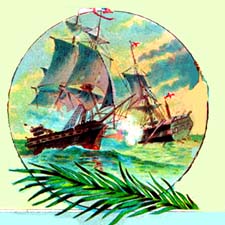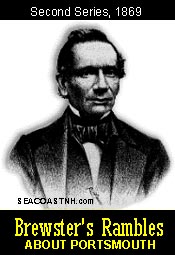|
FRESH STUFF DAILY |
|
|
||
|
|
||
|
|
||
|
SEE ALL SIGNED BOOKS by J. Dennis Robinson click here |
||
By rights Capt. Dan Fernald owned Fernald’s Island, but it was taken over by the feds for the Portsmouth Naval Shipyard. His parents are buried there still. A soldier in the Revolution, Fernald twice sneaked by the British delivering arms and battleship parts during the War of 1812.
His Family Owned Fernald's Island Until the Navy Came Editors Note: C.W. Brewster was a Portsmouth columnist in the mid-1800's. This article includes his opinions and may not reflect current research or current values. -- JDR RAMBLE CXXX. Capt. Daniel Fernald – Residence -- Ownership of the Navy Yard -- War Adventures -- Diddling the Spencer 74 -- Putting a British Frigate on the rocks. A FEW rods west of the South Ward Room, on the corner of Manning and Howard streets, stands an old gambrel-roofed house, which numbers almost as many years as the old Church itself which was removed from the spot in 1865. It was in a central part of the town when it was built, and the elevated position it then occupied must have made it a desirable residence. It was built by Capt. Samuel Frost, who died before the recollection of the late occupant, the venerable Capt. DANIEL FERNALD, the oldest person in Portsmouth at the time of his death, which occurred March 7, 1866, at the age of 98 years 3 1/2 months.
In 1788, Capt. Daniel Fernald married a daughter of Samuel Nichols, and became an occupant of this house, half of which he purchased, and the other half became his wife's by inheritance. We called on the old gentleman a few years before his death. He was feeble, and his hearing somewhat impaired, but he was as warm-hearted, and his recollection of early events as good as ever. The events of the day he was also able to keep in mind: for he told us he had attended church a few weeks previous and listened to his good pastor, Dr. Peabody. To the inquiry what did he preach about? he readily responded, "about Mary and Martha, and the one thing needful. I could not hear all he said, but was able to spell out much of it." How few church attendants there are who are able to repeat a text a fortnight after listening to a sermon. He showed us his old long lost family record, which had recently been found, written on the leaf of an old bible, and wafered to the cover. By it we learn that his father was George Fernald, who was born on the Island now the Navy Yard, in 1724, and was married in 1764 to Anna Leach, born in 1744. He was a regular descendant of Dr. Reginald Fernald, who was one of the first emigrants to New Hampshire. The island was a family inheritance, and would now be the property of Capt. Daniel Fernald, had not the right of primogeniture been abolished by the laws of Maine. The old gentleman informed us that at the time the United States purchased the island, in 1806, (when it was purchased of Capt. Wm. Dennett for $5,500,) lawyer Mason searched the records at Alfred, Maine, for the title. He found by the records that the island was to descend to the oldest male heir from generation to generation, "so long as the grass grows and the waters run." Had not the laws of Maine annulled all entailments, Mr. Mason said he could put Capt. Fernald in possession of the island at the time for not more than ten dollars expense. He looks with some interest yet upon the yard, for one of those great ship houses is erected over the grave of his father and family. Dr. Reginald Fernald, the original proprietor, says he was buried near the Brown place, on the main land near the Navy Yard. When a young man, Capt. Daniel Fernald participated in the Revolutionary War, and also in the war of 1812. He was ever a kind-hearted, humble man, and was treated with respect by every one. In the war of 1812 he was in command of the schooner Sally, a coaster, and might sometimes take a freight to Boston, and at others down east. It was in the dangerous days of that War, when the British men-of-war were off our coast, and sometimes in sight from the land, that Capt. Fernald took on board at Portland two 24-pound cannons needed at our Navy Yard, and 13,000 lbs. of powder, [130 kegs of 100 lbs.]--100 boarding pikes and cutlasses. The guns were placed in the keelson, and the kegs of powder around them. He then heaped spruce wood around them, and piled some cords on deck over the hatchways. With a speed far inferior to steam he left Portland for our harbor. Off Saco he was becalmed. The British 74 Spencer hove in sight. A tender commanded by a lieutenant was soon sent alongside. After inquiring, "Where from?"--Portland. "Where Bound?"--Portsmouth. "What is your cargo?"--Firewood--the Lieutenant not satisfied, ordered his men to remove the wood from the hatch, and see what was in the hold. They worked until tired, and when within one tier of the guns left the job, reporting that there was nothing but wood on deck and in the hold; and as the Captain appeared so inoffensive, the lieutenant, whose name was Robert Lashley, concluded to let the Sally pass. The sailors were in favor of making her a prize. Why, said the lieutenant it would cost just as much to condemn this poor man's wood craft as it would a large ship, and your prize money would not amount to a penny apiece. So saying they gave him up his papers, told him the way they had piled his wood was too heavy for the bows, and he had better right it, and left the Sally "a bone prize for John Bull," said Capt. Fernald, "if he had but known it." The interview was seen, and news reached Commodore Hull at the Portsmouth Navy Yard that the vessel was captured by the Spencer, and the guns and powder were of course supposed to have "gone off." But before long the Sally, slow and sure, appeared below, and the surprised Commodore speedily sent down his boats to tow her up to the Navy Yard, where, after the other wood was removed, the "big logs," and "kindlings" were rolled out. The Captain tells of this escape with much satisfaction. On another occasion, when preparations were making for building the Washington 74 at our Navy Yard, Captain Fernald was sent to Portland for a load of timber, &c. He took on board 48 knees and the breast hook of the 74, the knees hanging over the sides of the vessel. He pursued his course as near shore as practicable, being well acquainted with the whole coast. He was discovered, however, by the British frigate Tenados, and seeing his cargo, determined to make the Sally a prize. They were approaching Wood Island, and Captain Fernald took his course so near shore that his men cautioned him that he was among the kelp. No matter, says the Captain, throw over a few of the knees, and we will bring all up right directly. Four of the knees were thrown over, and on the Sally sailed between the rocks, while all of a sudden the frigate was resting upon them, and became a fixture! The exasperated Commodore ordered two 18-pounders to be discharged, to blow the Sally to pieces. The balls however did not hit, but one of them struck upon the rocks on shore, and after he made himself safe, Captain Fernald went on shore and found it. The frigate laid on the rocks until the rising of the tide enabled her to back off, leaving the Sally the victor. When the Sally came in, Commodore Hull inquired whether she had been fired upon. Capt. Fernald replied in the affirmative, presenting the 18-pound ball to the Commodore as a token. Commodore Hull replied, "You are a good fellow, you stand fire well -- go up to the Yard and we will unload you." Some years after the peace, Capt. Fernald fell in with a British tar, who was on board the frigate at the time. He said the Tenados was so much injured on our coast that she leaked badly, and was compelled to return immediately to Halifax and re-copper. Other of the old gentleman's recollections have been given in previous Rambles. Text scanned courtesy of The Brewster Family Network Please visit these SeacoastNH.com ad partners.
News about Portsmouth from Fosters.com |
| Friday, April 19, 2024 |


|
Copyright ® 1996-2020 SeacoastNH.com. All rights reserved. Privacy Statement
Site maintained by ad-cetera graphics

 Smuttynose Murders
Smuttynose Murders




















